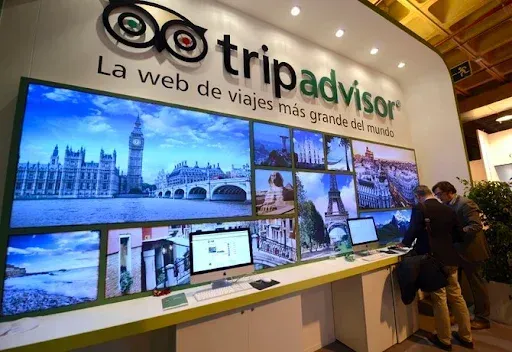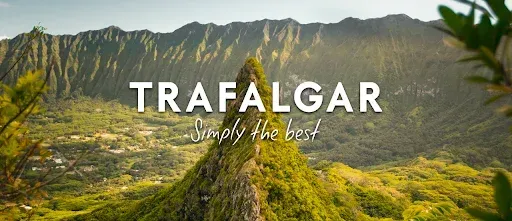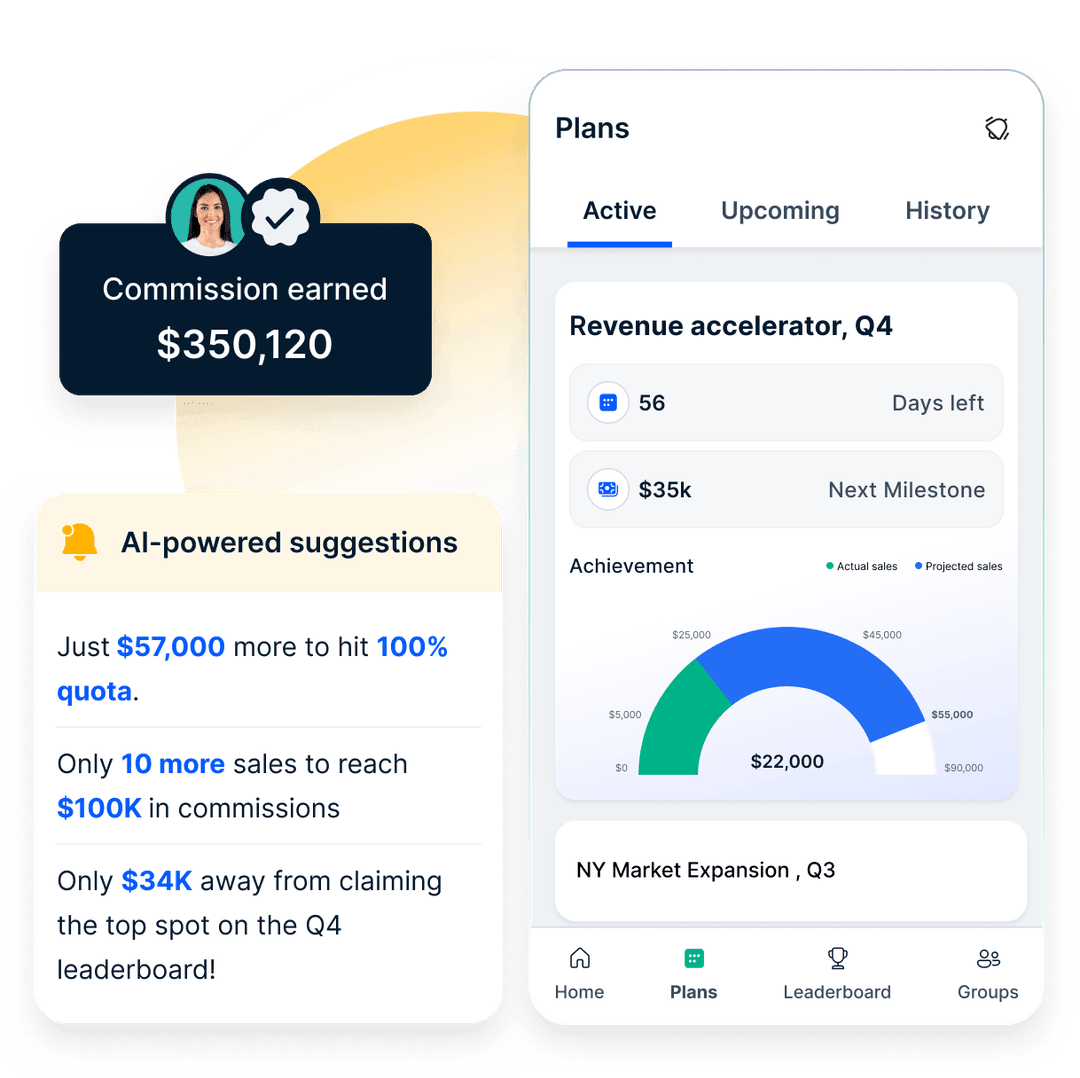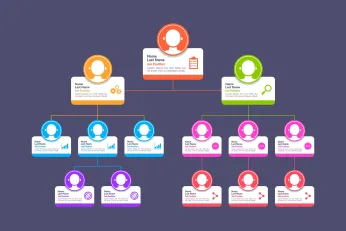8 Best Commission Ideas for Travel Agents to Revolutionize Travel Sales in 2025
Discover the best travel agent commission ideas to keep agents motivated and boost sales. Learn how much commission travel agents make and what percentage they earn across different travel services.
On this page
Every travel agent thrives on creating dream vacations, but keeping up the enthusiasm while managing bookings, client expectations, and competitive pricing isn't always easy. The real challenge for agency owners and team leaders isn’t just selling destinations—it’s keeping agents motivated to sell more.
This is where a well-structured travel agent commission plan makes all the difference. According to an IRF study, a thoughtfully designed compensation structure can increase employee performance by 44%. But how much commission do travel agents make, and what strategies work best to keep them engaged?
In this post, we'll break down simple yet effective commission ideas that inspire travel agents, drive results, and make selling more rewarding. Let’s dive in!
What is the average commission for a travel agent?
Travel agents can earn their income in various ways, including hourly wages, salaries, commissions, or a combination thereof. Commission rates often vary based on several factors, such as the agency's agreement with suppliers, the type of booking (e.g., flight, hotel, tour package), and the complexity of the travel arrangements.
On average, here's a general breakdown of commission rates for travel agents:
- Airline tickets: Most airlines no longer pay commissions to travel agents, but there are exceptions, especially when dealing with international flights or specialized bookings. When commissions are paid, they're typically between 1% and 2%.
- Hotels: Hotel bookings can offer commissions ranging from 5% to 10% or even more, depending on the hotel and the deal the agency has with them.
- Cruises: Cruises tend to have a higher commission rate, usually between 10% and 16% of the booking's total value.
- Tour packages: Commission for organized tour packages can vary widely, but rates from 10% to 20% are common.
- Rental cars: Car rental commissions are typically lower, often around 5%.
- Travel insurance: Commissions for travel insurance can be between 15% and 40% of the premium's cost.
It's essential to note that these are average figures, and actual commission rates can vary. Travel agents may also charge clients service fees, especially for more complex travel planning or when booking components that don't offer commissions. Additionally, larger agencies with more bookings might negotiate better supplier commission rates.
When travel agents are well-compensated and driven, their performance excels. With Compass, commission schemes and team performance indicators are now effortlessly managed and monitored.
How do travel agents make money?
Travel agents have various revenue streams as intermediaries between travelers and travel service providers. Their earnings often blend commissions, fees, and other incentives. Here's a breakdown of how travel agents typically make money:
- Commissions: This is the primary way many travel agents earn. When an agent books a hotel, cruise, tour, or other travel services, they receive a commission from the provider. This commission is a percentage of the cost of the booking.
- Consultation fees: Some agents charge for their expertise in planning and organizing complex trips, especially if it involves bespoke or luxury services. This is common among agents specializing in niche markets like luxury, adventure, or destination-specific travel.
- Vendor incentives: Sometimes, travel vendors offer additional incentives or bonuses for selling certain products or reaching booking quotas. These can be in the form of cash bonuses or free travel, which agents can use for personal trips or as familiarization trips to sell the experience better to clients.
- Mark-ups: In some instances, especially when dealing with tours or packages they've crafted, agents might add a markup to the net price they get from a supplier. This difference between the net price and the selling price becomes their earnings.
- Referral fees: Some agents earn money by referring clients to specialists or other service providers. For example, if a client needs specialized services outside of the agent's expertise, the agent might refer them to someone who can help and earn a fee for that referral.
- Annual bonuses: Depending on the travel agency's and vendors' agreement, some travel agents receive annual bonuses or incentives based on the volume or value of bookings throughout the year.
- Hosting events or classes: Some travel agents, especially those with deep expertise in specific areas, might host educational events or classes for travelers, earning money from entrance fees or sponsorships.
How travel agent commission works
To understand the foundation of travel agent commissions and how they are distributed, it is essential to know how these payments function. A key factor in this process is the accreditation number, a unique identifier that ensures agents receive their earnings. But what percentage do travel agents make?
Commission rates can vary based on partnerships, bookings, and agency agreements. This system determines how travel agents are paid on commission.
Let’s go through the process:
- When a travel agent partners with a supplier to book travel services, the supplier demands the travel agency's accreditation number in their booking procedure.
- This number is a vital connecting factor that enables the supplier to identify the right agent for the commission to be paid.
- The processes that occur in the context of the host agency are a little different. All travel agents in a host agency's network are included under one central accreditation number for operations.
- The distribution of commissions to all independent agents affiliated with the host agency is streamlined.
- On the other hand, any agency within partnerships and some franchises has a special accreditation number.
- This distinctive identity ensures the exact allocation of commissions to the appropriate agency.
Understanding this method lets us see how the process is made transparent and organized by ensuring that the commission goes to the appropriate travel agent using the correct accreditation number.
With Compass, every facet of your commission system is seamlessly automated. Revolutionize how you oversee, compensate, and incentivize travel agents each pay period. You inherently boost engagement and performance by providing agents access to a real-time, data-driven commission platform.
4 Factors affecting travel agent commission percentage
The proportion of commission that a travel agent earns might change depending on several critical factors in the travel sector. Understanding these elements is essential in determining how commission rates are set and how they affect travel brokers' profits.
The following are some key factors that influence the commission percentages for travel agents:
1. Type of travel service
The commission rates for various travel services, including flights, hotels, and cruises, may vary. Depending on their profitability or level of demand, some services may have larger commission percentages.
2. Travel supplier agreements
Commission rates are heavily influenced by the terms of any agreements that have been signed between suppliers and travel agents. The particular commission rates that the travel agent will receive when selling the supplier's services are specified in these agreements.
3. Sales volume and performance
The volume of business a travel agent brings in, which is usually measured by their performance and sales volume, might affect the commission percentages. Agents with a bigger number of sales may bargain with suppliers for higher rates for commissions.
4. Location and market dynamics
The geographical location of the travel agent and the local market conditions may impact the commission rates. Depending on the level of market competition and cost of living, different locations may have different commission structures.
How much commission do travel agents make
Commission rates and salaries of travel agents in the USA can vary widely based on the type of service provided and the industry segment. It's essential to note that these rates may be subject to change, and agents should always check with their specific travel partners for the most up-to-date information.
1. Airline commissions
- Airline commissions can vary between 0% and 22%, depending on whether the flights are domestic or international. Nevertheless, certain airlines have recently decreased or removed commissions, leading agents to impose service fees directly on clients or shift their focus to alternative revenue sources.
- Some carriers, particularly low-cost airlines, may not provide any commission, while traditional carriers might offer a reduced rate.
2. Cruise commissions
- Cruise lines often maintain a more traditional commission model, with agents earning a percentage of the total cruise fare.
- Commissions for cruise bookings can range from 10% to 16%, depending on the cruise line, the type of cabin booked, and other factors.
3. Hotel commissions
- Hotel commissions can vary widely and may depend on the specific hotel or hotel chain.
- It's not uncommon for travel agents to earn commissions ranging from 8% to 15% on hotel bookings.
4. Tour and package commissions
- Commissions for tour packages and vacation packages can vary based on the tour operator or travel company.
- Agents may earn commissions ranging from 10% to 20% or more for booking comprehensive tour packages.
8 Best commission ideas for travel agents to motivate them
Here are 8 best commission ideas for travel agents to motivate them and boost sales.
1. Tiered loyalty commission
Travel agents are rewarded with increased commission percentages based on the number of repeat clients they bring or maintain. This structure promotes agent dedication to high-quality service, motivating them to ensure clients keep returning and increasing their commission over time.
Marriott International, through its "Marriott Bonvoy" program, offers a stellar example of a tiered loyalty system in the travel sector. While primarily designed for guests, this program also benefits travel agents.

As guests frequent Marriott properties, they accumulate points, advancing through tiers like Member, Silver Elite, and Gold Elite, each offering unique perks. Having introduced clients to Marriott Bonvoy, travel agents often find these clients returning for repeat bookings at Marriott establishments, leading to consistent business.
Moreover, Marriott's "Hotel Excellence!" program trains agents to become "Hotel Sales Specialists," potentially offering them perks and special rates. While not a direct tiered commission for agents, the system encourages increased bookings, indirectly creating a tiered benefit system for them.
2. Experience-based rewards
Instead of a flat commission rate for all types of bookings, agencies offer a higher commission for selling "experiences" or niche travel packages. This could be anything from culinary tours, adventure sports holidays, and eco-tourism trips, to wellness retreats.
The idea is to encourage agents to sell richer experiences, which are often more profitable and lead to more satisfied customers.
One exemplary company in the travel sector that employs experience-based rewards for travel agencies is Four Seasons Hotels and Resorts. Recognizing agents' pivotal role in driving bookings, Four Seasons occasionally offers exclusive "fam" (familiarization) trips to their top-performing agents.
These trips aren't just about sightseeing; they provide agents a luxurious experience at the company's premier resorts and hotels.

The idea is simple: by immersing agents in the opulence Four Seasons offers, they are better positioned to sell these experiences to potential travelers. This hands-on approach ensures agents understand the brand's offerings intimately, allowing them to give genuine recommendations to their clients.
So, instead of just monetary rewards, the agents enjoy the luxury they promote, making their selling proposition all the more authentic.
3. Green travel incentives
As sustainable and eco-friendly travel grows in demand, agencies can offer higher commission rates for selling eco-friendly packages or accommodations. This motivates agents to promote green travel options and aligns the agency's operations with global sustainability efforts, appealing to a more environmentally-conscious clientele.
Intrepid Travel, a pioneer in responsible tourism, provides a compelling model of integrating green travel incentives within the travel industry. Driven by a commitment to sustainable and eco-friendly travel, Intrepid Travel doesn't just offer unique adventures to its clientele and incentivizes travel agents who promote these eco-conscious trips.
For instance, they might offer special recognition or bonus commissions for agents who prioritize bookings of their carbon-neutral tours or those who support local communities.
Additionally, by organizing educational trips for agents that showcase the importance of sustainable practices, Intrepid ensures that agents become ambassadors for green travel.
Such initiatives underscore the company's ethos: travel should be an experience for tourists and contribute positively to the planet and its inhabitants. By aligning agent incentives with this philosophy, Intrepid Travel makes a strong case for the intersection of business and environmental responsibility in the travel sector.
4. Dynamic commission based on feedback
Implement a system where part of the agent's commission is determined by client post-trip feedback. For every positive review or feedback form, the agent could earn an additional percentage on top of their base commission.
This emphasizes the importance of making a sale and ensuring the traveler has an exceptional experience from start to finish.
TripAdvisor, known primarily for its vast repository of traveler reviews and ratings, has also ventured into travel bookings and partnerships with travel agencies. Leveraging its core strength of user feedback, TripAdvisor has introduced a model where commissions can be influenced by the quality of experiences delivered by travel agents.

In this dynamic model, travel agents who consistently garner positive feedback and high ratings from travelers might receive higher commissions or preferential partnership terms. Conversely, agents with lower ratings might face reduced commissions until their service quality improves.
This system prioritizes the traveler's experience, ensuring that agents are incentivized to sell and provide top-tier service. By integrating real-time feedback into their commission structure, TripAdvisor reinforces the importance of customer satisfaction in the travel industry.
5. Sustainability commission
Travel agents can earn a commission by promoting sustainable travel options to their clients. This could include booking eco-friendly accommodations, recommending low-impact transportation, and suggesting activities that support local communities and the environment. Contiki, a travel company specializing in tours for young adults, demonstrates a commitment to group travel and sustainability. Recognizing the growing demand for responsible travel among younger generations, Contiki has developed tours that focus on sustainable and eco-friendly practices.

Contiki offers a "Group Sustainability Commission" for travel agents to promote this initiative and encourage bookings of these specialized tours. This means agents receive a premium commission when they organize larger group bookings for these eco-conscious tours than regular tours.
The initiative emphasizes the company’s dedication to sustainability and motivates agents to champion these green initiatives to potential travelers. Contiki is paving the way for a more sustainable future in the travel industry by intertwining the allure of group travel with a commitment to the environment.
6. Group travel loyalty commission
Travel agents can earn a commission on the initial group booking and the repeat business generated from group travelers. This commission could be tiered, increasing with each subsequent booking made by the same group or its members.Trafalgar, a long-standing operator in the guided holiday sector, has effectively utilized the Group Travel Loyalty Commission concept. Catering to diverse groups, from families to corporate outings, Trafalgar recognizes the logistical intricacies and enhanced value group bookings bring.
In response, they've set up a loyalty commission model where travel agents are rewarded more generously for recurring group bookings.

The idea is twofold: to acknowledge the efforts agents invest in orchestrating such complex arrangements and to incentivize the cultivation of repeat group business. As groups return year after year for new adventures, agents enjoy a progressive commission scale, reflecting both their clientele's volume and loyalty.
Through this model, Trafalgar ensures a steady flow of group travelers and fosters enduring relationships with the agents who make it all possible.
7. Experiential travel commission
Reward agents for curating and booking immersive, off-the-beaten-path experiences for travelers. This includes local homestays, artisan workshops, food tastings, or cultural exchange programs. Instead of just promoting popular tourist destinations, agents are incentivized to create a deeper and more authentic travel experience for their clients.
Intrepid Travel, known for its adventure and experiential travel tours, could offer a special commission program for agents who prioritize and successfully book such authentic travel experiences for clients. This encourages travel agents to focus on deeper cultural immersion and unique experiences over standard touristy options.
8. Long-stay booking commission
As the nature of work changes and more people become digital nomads or choose to work remotely from scenic destinations, there's a growing demand for longer stays (e.g., a month or more) in certain destinations.
Travel agents can earn a higher commission for long-term bookings, reflecting the value of securing accommodations and services for extended periods.
Black Tomato, a bespoke travel company, stands out for its focus on crafting unique, tailor-made journeys. Acknowledging the intricacy of these experiential trips, the company offers an "Experiential Travel Commission" to its agents.
Instead of traditional flat-rate commissions, agents are rewarded for the depth and creativity of the experiences they help design, such as private dinners in remote locales or immersive cultural activities. This approach motivates agents to elevate travel from mere sightseeing to truly transformative experiences.
These ideas cater to emerging travel trends and patterns, ensuring that travel agents are well-positioned to meet the evolving needs of modern travelers.
Commission structures of companies in travel industry
Here are 2 commission structure of companies in travel industry,
1. Expedia
One of the world's top full-service online travel companies, Expedia makes it simple for travelers to plan and organize trips from the most extensive range of vacation packages, flights, hotels, rental cars, rail, and cruises.
- They have a travel agent affiliate program that offers tiered commission rates to the agent.
- Their earnings are calculated based on the total booking value, including taxes, to allow agents to earn more money.
- As agents create more reservations, they increase commission tiers and see an increase in revenue per booking.
- They give 6.0% commission on packages, 7.5% on vehicle rentals, and up to 11.5% commission on hotels and activities.
2. Booking.com
Booking.com is another large travel marketplace that provides properties worldwide and access to various transportation choices and amazing lodging alternatives, including homes, hotels, and much more.
- Booking.com offers a flat commission-based model for its travel agents, meaning they pay a predetermined percentage of each reservation that agents make using their website.
- The commission percentage varies by nation and may also change based on the kind or location of the property.
- The commission rate ranges from 10% to 25% depending on the property and its location. On an average, it is 15% fixed.
The future of travel agent commissions with Compass
The travel industry continues to shift, and so do commission structures for travel agents. With the growing dominance of online booking platforms and direct consumer bookings, agents face increasing challenges in maintaining their commission-based income. Despite these shifts, travelers still rely on expert guidance and personalized service, keeping commissions a key part of the industry.

This is where Compass transforms how travel agents and agencies manage their earnings. Instead of navigating complex and often inconsistent commission structures, Compass automates and streamlines the entire commission process, ensuring agents get paid accurately and on time.
With real-time commission tracking, automated payouts, and performance-based incentives, Compass eliminates manual calculations and payment delays, allowing agencies to focus on sales and customer satisfaction.
By using Compass’s AI-driven commission automation, agencies can motivate their teams with transparent earnings, custom commission structures, and real-time insights into their performance. This ensures that top-performing agents are rewarded instantly, leading to higher engagement and better sales results.
As travel agent commissions evolve, Compass empowers agencies with a smarter, data-driven approach to commission management, making the entire process seamless, scalable, and rewarding for agents and agencies alike.
Conclusion
Commission for travel agents is a crucial aspect of their income, allowing them to offer expert advice, personalized service, and added value to their clients. While the traditional commission model has evolved, travel agents continue to find creative ways to earn income, including through ancillary services and negotiated commission agreements.
Ultimately, the relationship between travel agents and their clients is built on trust, and commissions reflect agents' value to the travel experience. So, whether you're a traveler seeking expert guidance or a travel agent looking to thrive in the industry, understanding how commissions work is essential for a successful journey.
FAQ's
Are travel agents commission-based?
Yes, many travel agents earn commissions as a significant part of their income. Travel agents typically receive commissions from the travel suppliers, such as airlines, hotels, cruise lines, and tour operators, for the bookings they make on behalf of their clients.
The commission structure can vary widely based on the type of travel product, the specific supplier, and the agreements in place between the travel agent and the supplier.
What determines the commission rate for travel agents?
Commission rates for travel agents can vary and are often negotiated between the travel agent and the travel supplier (such as hotels, airlines, cruise lines, etc.). The rates may depend on factors like the volume of business, the type of travel products sold, and the agreements in place.
Do travel agents earn a commission on all bookings?
Not necessarily. While many travel agents earn commissions on bookings, the structure can vary. Some agents may earn commissions on certain types of bookings (e.g., hotels, tours), while others may charge service fees for certain services.
How much commission do travel agents typically earn?
Commission rates can range widely. In the airline industry, for example, commissions have been reduced significantly over the years, and agents may rely more on service fees. For hotels and other travel products, commission rates may range from a few percent to more significant percentages.
Do travel agents charge clients additional fees?
Yes, some travel agents charge clients service fees in addition to earning commissions. These fees can cover the agent's time and expertise in planning and booking the trip.
Are there differences in commission structures for online travel agencies (OTAs) and traditional travel agencies?
Yes, there can be differences. Traditional travel agencies may have more flexibility in negotiating commission rates with suppliers, while OTAs often have standard commission structures. OTAs may also rely on other revenue streams, such as advertising and booking fees.
How has the commission structure for travel agents changed over time?
The travel industry has seen changes in commission structures, especially with the rise of online booking platforms. Many airlines have reduced or eliminated commissions, leading travel agents to adapt by incorporating service fees or focusing on other travel products.
Do travel agents earn commissions on travel insurance?
Yes, travel agents may earn commissions on travel insurance sales. The commission rates can vary depending on the insurance provider and the agreement between the agent and the insurance company.













